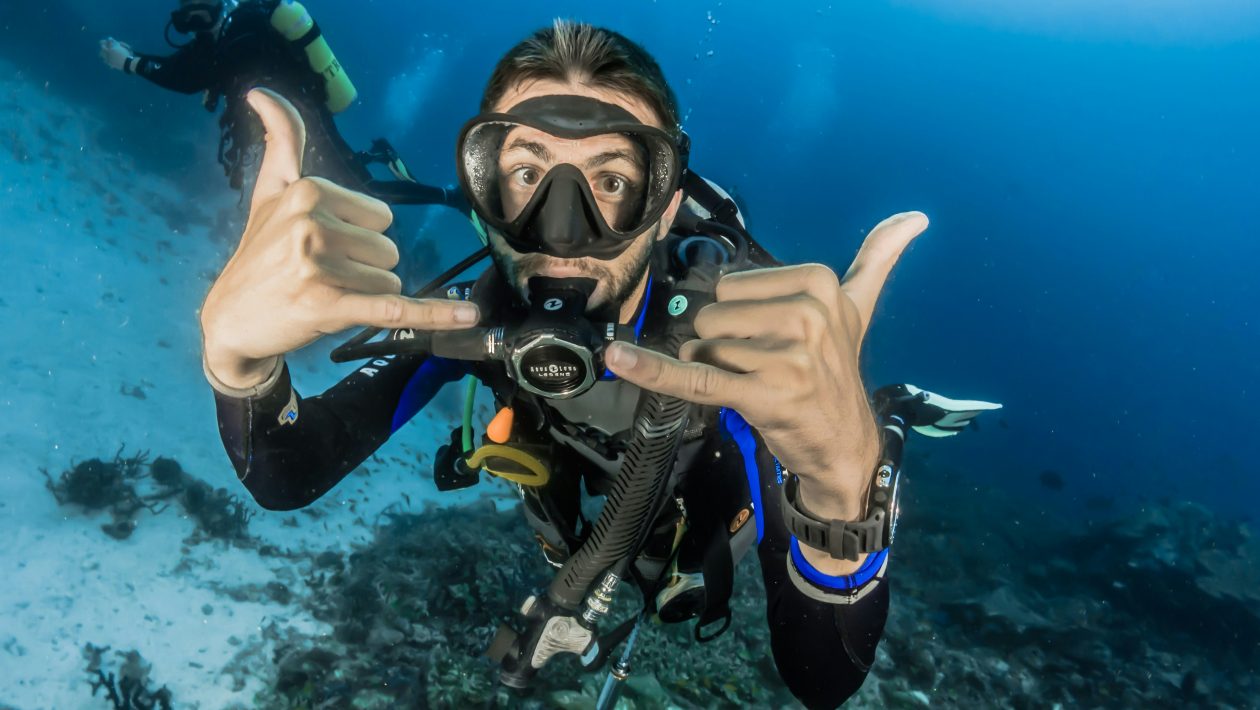Divers can descend as far as 130 feet below the surface. Through a mouthpiece connected to a pressurized air tank, they inhale. Below are some precautions and considerations for divers from hospitals in Dubai for safe diving. Not only that, but you can also get the right diving medicine from the best hospitals located in Dubai.
- Obtain Certification and Develop Proficiency in Subjects
Because diving is risky, specific training is needed. The training follows a curriculum created by accredited diving organizations; divers gain knowledge of diving concepts and hone their abilities by swimming in open and restricted water. The knowledge on safety is introduced gradually, and divers will discover the unique dangers associated with each swimming level they aspire to achieve and strategies for mitigating those hazards.
Among the essential diving safety techniques you should learn and perfect are using your buddy’s backup air supply, performing a Controlled Emergency Swimming Ascent (CESA), disconnecting your pressure inflator hose, clearing your mask, CPR, and administering emergency oxygen.
- Maintain Your Health
Ensuring you’re in good health preceding a dive is one of the most overlooked safety precautions. What, therefore, ought divers to do to ensure their safety?
Here are some things you ought to and ought not to do:
- Abstain from alcohol. Pre-dive drinking increases the danger of nitrogen narcosis, heat exhaustion, poor judgement, and disruptions to response time, memory, and eye coordination, among other things.
- Avoid smoking. It’s best to give up smoking at least a day before diving. Do not smoke between dives if you conduct numerous dives that day. Smoke before a dive lowers tissue oxygenation, which impairs optimal bodily performance.
- Exercise. You’re subjecting your body to tremendous pressure when diving. Enhanced physical fitness lowers the risk of decompression sickness (DCS) via improving circulation and oxygen transport. Working out even a day before your dive will reduce the chance of developing DCS.
Obtain a medical evaluation. It’s advised to check yourself regularly to ensure you’re in excellent health because diving might be incompatible with certain medical issues. You can even avoid drowning with a regular cold or sinus infection. Even then, if you might get sick, you can always buy the right diving medicine in dubai.
- Get to Know Your Dive Location(s)
The safety precautions for diving vary depending on where you’re diving, from what equipment to pack and how to use it to when it’s safest to dive. Inquire with the nearby diving centre about the visibility, water conditions, currents, potential wildlife encounters, and weather. It’s crucial to find out about the amenities available on the premises and confirm that you will have permission to use emergency supplies.
Purchase Your Equipment
Purchasing your equipment is one way to increase your safety if you’re passionate about diving and want to dive frequently. You’ll be able to concentrate on the details of your dive since your equipment will fit well, you’ll become used to it, and you’ll constantly understand how to work it safely. Although purchasing and transporting a tank abroad may not be your first choice, items such as regulators, wetsuits, dive computers, and the like are more manageable to pack.
- Examine Your Equipment Again
Make sure your equipment is safe before every dive, regardless of whether you own or rent it. Examine it for wear and tear; keep an eye out for frayed places that can cause leaks, broken buckles and straps, and malfunctioning zippers. Regular checks for functional problems should also be performed on your tank and regulator.
- Recognize Your Boundaries
Divers ought to stay within their limitations at all times. Don’t dive if you don’t feel psychologically and physically capable, or don’t yet possess the necessary set of abilities for a particular kind of dive. It’s OK to postpone or switch to a dive site where you feel more comfortable.
You must understand the value of staying with what you know, yet ethical dive centres will not permit you to dive at a location that exceeds your certification level. Your dives have to be in line with your background and expertise.
- Bring a friend—and be a kind friend.
Diving with a companion is among the finest ways to ensure your diving safety. Although all divers should be able to care for themselves, it never hurts to have an extra set of hands and eyes and an extra mask in case of emergency.
When you operate in pairs, you can quickly solve many underwater difficulties, but only if you can see your diving companion.
- Acquire Knowledge of Dive Signals from good hospitals in dubai
You cannot converse with other divers when submerged. Therefore, you must find another way to communicate. You can utilize a variety of hand signals, ranging from maritime to crucial safety signs. To communicate with each other, you and the other swimmers must grasp the safety signs.
- Make a plan and then get into it.
Another diving-related safety precaution you should take is to plan your dive. Along with other things, you and your swimming partner(s) should agree about the hand signals, the deepest depth that you will dive to, and the bottom time before you go underwater.
Diving schools teach both novice and expert divers how to plan a dive. You can utilize various equipment, such as recreational dive planners, dive monitors and timing devices, to organize your dive.
- Get Travel/ Diving Insurance
On a diving trip, you will never be too certain that everything will go as planned. It can be quite expensive to visit a hospital in another nation, particularly if you ever require a decompression chamber. You may avoid paying a lot of dough on healthcare bills by purchasing a decent diving policy or a travel cover that ensures accidents are sustained while engaging in this activity.





